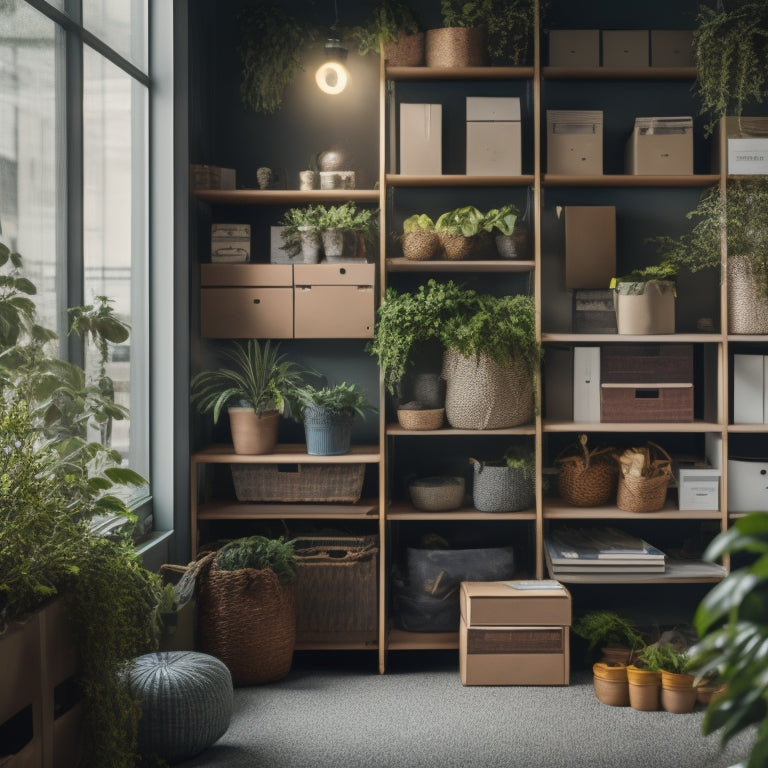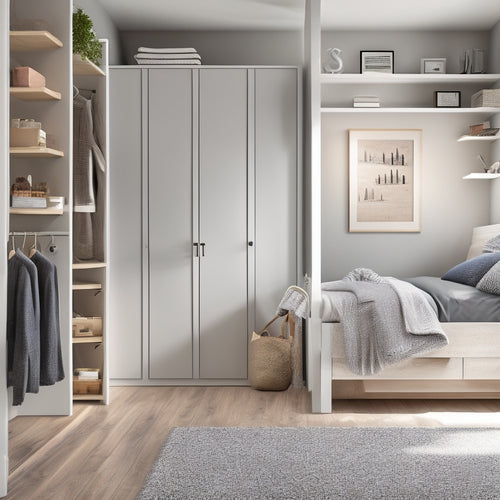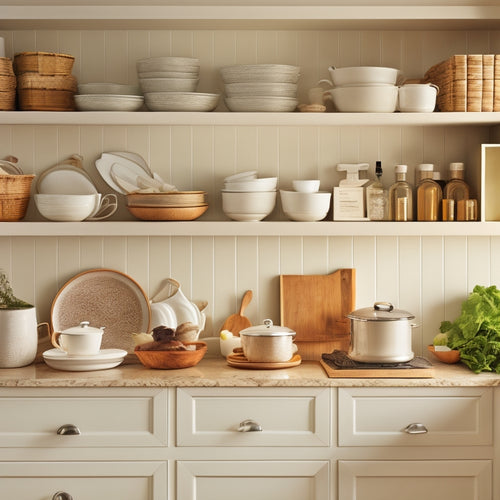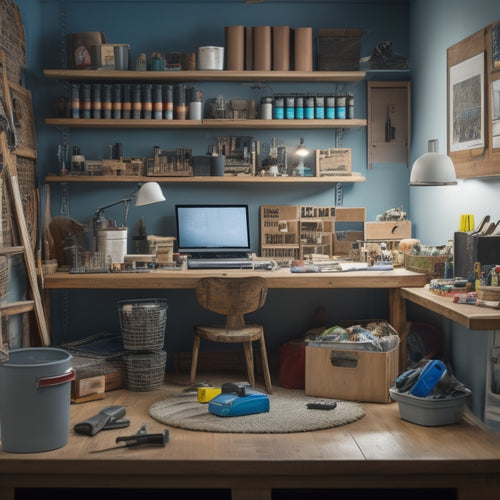
Essential Tips for Self-Storage Success
Share
To achieve self-storage success, it's important to select the right storage unit size based on your belongings, optimize space with organizing strategies, and consider climate control for sensitive items. Flexible rental options can also be tailored to your unique needs. Effective item organization, labeling, and airtight containers can protect your stored items from damage. A thorough security plan, robust locks, and a facility with advanced security measures can guarantee the safety of your belongings. By following these essential tips, you'll be well on your way to a seamless self-storage experience, and discovering more best practices can further enhance your storage journey.
Key Takeaways
• Determine the right storage unit size by creating a list of items and using a size guide to avoid under or overestimating space needs.
• Maximize storage space by implementing organizing strategies, categorizing items, and using space-saving hacks like labeling boxes and storing heavy items at the bottom.
• Choose a storage facility that offers flexible rental agreements and tailor the storage solution to unique needs and circumstances.
• Protect stored items by implementing effective organization strategies, categorizing and labeling items, and storing items in airtight containers to prevent moisture buildup.
• Ensure the security of belongings by using robust locking mechanisms, choosing a facility with advanced security measures, and opting for 24/7 surveillance and gated access.
Choosing the Right Storage Unit
When selecting a self-storage unit, it is crucial to determine the appropriate size to effectively store your belongings, guaranteeing you only pay for the space you need. A common mistake is to overestimate or underestimate the required unit size, resulting in wasted space or unnecessary expenses.
To prevent this, create a list of items to be stored and use a size guide to choose the ideal unit size. Additionally, consider the type of items being stored and whether they require climate control.
Sensitive items like furniture and electronics benefit from temperature-controlled storage, providing protection from extreme temperatures and dust exposure. By choosing the right unit size and climate control, you can ensure efficient storage and peace of mind.
Maximizing Your Storage Space
Once you've selected the right-sized storage unit, the next step is to optimize its space to accommodate your belongings efficiently, ensuring maximum storage capacity and ease of access.
Implementing clever organizing strategies and space-saving hacks will make all the difference. Efficient packing is key, so start by categorizing items into groups and labeling boxes clearly.
Consider a 'first-in, first-out' approach to guarantee easy access to frequently used items. Strategic item arrangement is also vital – store heavy items at the bottom and fragile ones on top.
Flexibility in Rental Options
With Advantage Self-Storage, flexibility is built into every rental agreement, allowing you to tailor your storage solution to your unique needs and circumstances.
Our rental duration options are designed to accommodate your changing requirements, whether you need storage for a short-term project or a long-term solution. Enjoy the freedom of month-to-month flexibility, giving you the power to adjust your rental period as needed.
No long-term commitments are required, and our helpful storage professionals are always available to provide guidance. This flexibility guarantees you're only paying for the storage you need, when you need it.
Protecting Your Stored Items
Your valuable possessions deserve protection, and at Advantage Self-Storage, we recognize the importance of safeguarding your stored items from potential risks and damages.
To guarantee the safety of your belongings, we recommend implementing effective item organization strategies, such as categorizing and labeling your items, and storing them in airtight containers to prevent moisture buildup.
Additionally, our facilities are designed with pest prevention in mind, featuring regular pest control measures to keep unwanted critters at bay.
By taking these proactive steps, you can greatly reduce the risk of damage to your stored items.
Securing Your Belongings
Implementing a thorough security plan is essential to ensuring the protection of your stored belongings from theft, damage, or loss.
A solid security plan begins with robust locking mechanisms, such as disc locks or cylinder locks, which provide an additional layer of protection against unauthorized access.
Additionally, opting for a storage facility with advanced security measures, such as 24/7 surveillance, gated access, and on-site staff, can greatly reduce the risk of theft or damage.
By combining these security measures, you can rest assured that your stored items are safe and secure.
Frequently Asked Questions
Can I Store Hazardous Materials in a Self-Storage Unit?
Storing hazardous materials in a self-storage unit is a serious concern. It's essential to prioritize environmental impact and safety protocols.
Unfortunately, most self-storage facilities strictly prohibit storing hazardous materials, such as chemicals, fuels, or radioactive substances, due to the risks they pose to human health and the environment.
Instead, consider exploring specialized facilities or services designed for hazardous material storage, ensuring compliance with regulations and maintaining a safe environment for everyone involved.
Are There Any Restrictions on Storing Food or Perishable Items?
When it comes to storing food or perishable items, it's important to take into account the potential risks.
Most self-storage facilities prohibit storing perishable goods due to pest control concerns and the potential for spoilage.
Climate-controlled units can maintain a consistent temperature, but they're not designed to preserve food or perishable items.
It's vital to explore alternative storage options, such as refrigerated storage facilities or climate-controlled containers, to guarantee the safety and integrity of your stored items.
Always check with your storage provider for specific guidelines and restrictions.
Can I Have 24/7 Access to My Storage Unit at Any Time?
Imagine needing to retrieve an important document from your storage unit at midnight. With 24/7 access, you can do just that. Enjoy the freedom to visit your unit at any hour, whether it's during a late night work session or an early morning prep for a big event.
Our access flexibility guarantees that your belongings are always within reach, whenever you need them. Simply use your secure lock and enjoy the convenience of unrestricted access to your storage unit.
Do I Need to Provide My Own Shelving and Storage Containers?
When it comes to storing your belongings, unit organization is essential for efficient space maximization.
While it's not necessary to provide your own shelving and storage containers, doing so can help optimize your storage space and keep your items easily accessible.
Consider investing in sturdy shelving units and durable containers to keep your belongings organized and protected.
This will guarantee that you make the most of your storage unit's capacity and can find what you need quickly and easily.
Are There Any Discounts Available for Long-Term Storage Rentals?
When it comes to long-term storage rentals, discounts are often available to reward customer loyalty.
For instance, many self-storage facilities offer student discounts for those storing items during the semester or summer breaks.
Additionally, military benefits may be provided to active and veteran personnel as a token of appreciation for their service.
Be sure to inquire about these discounts when renting your unit to maximize your savings.
Related Posts
-

7 Clever Hacks for Small Bedroom Storage
You're about to discover the secret to revealing generous storage in even the smallest of bedrooms. Start by maximizi...
-

Why Kitchen Cabinet Organization Matters Most
You're likely losing more than just time and ingredients when you can't find what you need in your kitchen cabinets -...
-

What Makes Effective Online DIY Home Organization Courses?
You're about to reveal the secrets to transforming your living space into a serene and functional oasis, and it all b...


